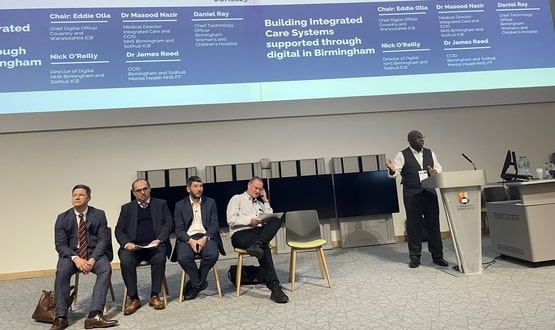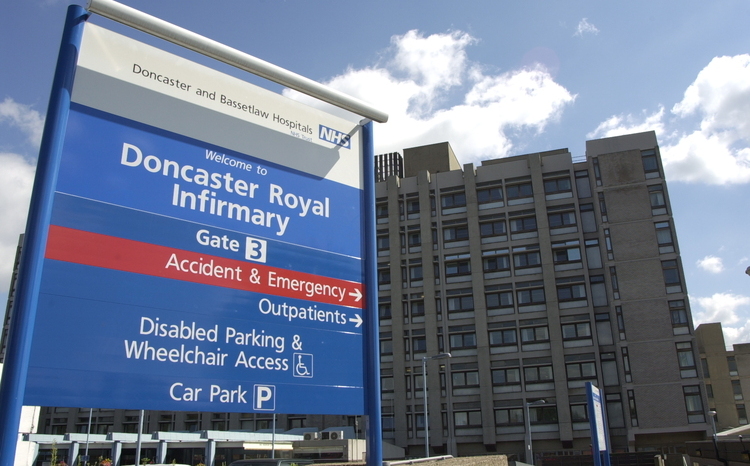Digital support of ICBs requires focus on overall system – Birmingham case
- 28 July 2023

Digital support of integrated care boards (ICBs) needs to focus on the goals of the overall system rather than its constituent parts, members of the Birmingham and Solihull ICB team told a Friday morning session at Digital Health Summer Schools 2023.
“In the ICB, it is really important to assure close engagement and buy-in at each stage,” said Professor Daniel Ray, chief technology officer and DPO of Birmingham Women’s and Children’s NHS Foundation Trust.
“We need to ensure that the organisation strategy fits with the system strategy, making sure that what we are setting out is consistent not just with or organisation but with other organisations we work with in the system around us.”
The system’s first digital strategy included five strategic objectives: eliminating health disparities, collaboration across organisations; implementation of a shared care record; digital solutions to improve health outcomes and care quality; and an emphasis on cyber safety.
Nick O’Reilly, director of digital at the ICB, noted that it takes time and healthy challenges to build good system leadership, and that it is important to communicate the idea that teams outperform individuals. He added: “Quite often it can be much easier to compete with each other than to collaborate with each other.”
The biggest challenges ICBs face have to do with capacity and resources, O’Reilly said. He added: “As long as these are localised, it is hard to do system-wide projects. Pooling capacity, skills and resources will allow us to do a lot more.”
Shared records a “nuts and bolts” project
Dr. James Reed, a consultant psychiatrist and chief clinical information officer at Birmingham & Solihull Mental Health NHS Foundation Trust, discussed the implementation of a shared care record at the trust, for which he was clinical lead.
The record system was set up quickly in March 2020 to serve the Nightingale Hospital, which was constructed for the pandemic but never used.
“It was a nuts-and-bolts achievement showing what can be done when you want to do something,” he said, adding that the record system was built on a mental-health records sharing system.
“Rather than doing [the records] in an emergency panic situation, we were able to do them in a more measured way,” he said. “A bit like the Death Star, the system is under construction but fully operational.”
In addition to the rest of the ICB, the shared records have an interface with Birmingham City Council. Birmingham prison and hospices also have access. Two neighbouring regions – Hereford and Worcestershire Health and Care and Coventry and Warwickshire, expressed interest in doing the same work, Reed said; now all three are using the same system.
Breaking the silos around pathways and protocols is also a key part of ICB digital leadership, said Masood Nazir, medical director integrated care and Chief Clinical Information Officer at Birmingham and Solihull ICB, adding that digital leaders need to choose the right team, with depth of experience.
Clinicians in a digital role also need to ensure that they aren’t excluded from important decisions, he said: “Be at the right tables. If you are not there with the evidence, change will happen to you. Data sharing is especially important to help clinicians make “data decisions, rather than subjective ones,” he said.
Ray agreed that linked data strategies are fundamental to understanding outcomes across the ICB.
He said: “An investment decision has to be taken within a whole system, not just a single organisation. Make sure change is sustainable.”
He also recounted his organisation’s experience with introducing an electronic patient record (EPR) system.
“Looking after a group zero hospital and going through business case process, the network really helped,” he said. He added that trusts going through the process at the same time could support one another, with those slightly further ahead talking to others and explaining the time scales and what to watch out for.
Digital Health Summer Schools is taking place at the University of Birmingham, where CCIOs, CIOs, CNIOs and aspiring digital health leaders enjoy two days of CPD-accredited content, rewarding education, networking, and best practice exchange, and have a unique opportunity to learn from the very best digital health leaders from across the UK.




